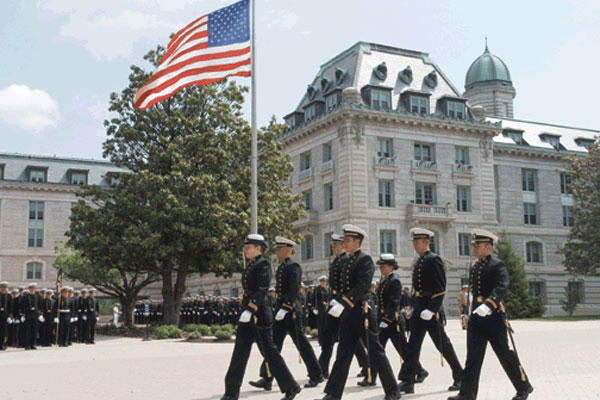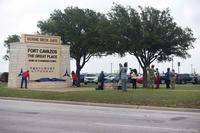NEW YORK — A team of three U.S. Naval Academy midshipmen claimed first place in the Cyber Policy Competition Nov. 14 during New York University's 12th annual Cyber Security Awareness Week event.
The policy competition challenges students to propose public policy solutions to real-world computer security challenges.
The 2015 challenge focused on the controversial question of whether or not the U.S. should implement a "bug bounty" program — a system of rewards for security researchers who find vulnerabilities in major software programs and networks.
"It was a unique opportunity that allowed us to expand beyond the traditional image of cyber, and true to the cyber operations major, demonstrate that we have a grasp on issues at the macro level as well," said Midshipman 1st Class Max Goldwasser.
The competition consisted of a preliminary round, during which teams prepared and submitted a policy memorandum for consideration. The judges — industry and academic professionals in the cyber field - narrowed the entries to five finalists.
The five teams then drafted a full public policy proposal and poster to present at the competition in New York. Although the proposals differed widely, all finalists recommended legislative changes that would eliminate penalties for white hat hacking, a process that helps institutions find flaws in their networks.
"The judges commented that one of the biggest strengths our team offered was the ability to articulate thoughtful considerations about the creativity, feasibility, and the depth of knowledge on the subject," said Midshipman 1st Class Zac Dannelly. "The cyber operations major unequivocally prepared our team with the technical background necessary to identify the problems, the understanding of political intricacies to appreciate the circumstances, and the professional development to present both of these facets in a clear and straightforward way."
The Naval Academy's cyber operations major is an interdisciplinary program that balances technical training with courses in areas such as policy, law, ethics, and social engineering. Dannelly, Goldwasser and teammate Midshipman 1st Class Bill Young will be among the first midshipmen to graduate with a cyber operations degree.
"I think our ability to integrate technical concepts within the larger framework of public policy stands as a testament to the Naval Academy as a whole, where midshipmen are expected to develop a well-rounded view of world issues," said Young.
The academy also mandates basic cyber security classes for all students. The baseline is to provide every academy graduate with an understanding of the cyber domain and how it impacts their commands and their ability to conduct their missions.
"This is a great reflection of our program here," said Academy Superintendent Vice Adm. Ted Carter. "The mids have a strong foundation and understanding of the technical issues, coupled with a broader awareness and appreciation of many of the other non-technical, legal, and policy factors in the cyber domain."




























